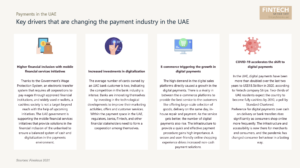Paytech in the UAE is one of the top emerging opportunities being eyed by startups, financial institutions and investors.
Demand for finance apps in the country was already on the uptake. In Q1 this year, demand for these apps climbed 60% in the UAE, in line with a surge of over 200% since Q1 2019. And along with banking and investment apps, paytech is at the forefront of this growth.
According to the Fintech News UAE Fintech Report 2021, US$18.5 billion was processed in digital payment transactions in 2020. Meanwhile, 88% of in-person transactions were contactless.
The report notes that there are a total of 36 payments apps in the UAE right now, including international payments upstart Stripe, which opened its first regional office in the UAE earlier this year. To add to this, this early but growing industry also has 10 players in the space of digital wallets, for which demand has been on the rise across the region.
Interestingly, one report notes that the growth in paytech in the UAE may not lead to a cashless economy, but is happening alongside a growth in cash usage. While cash was still integral to the UAE economy, paytech has emerged as a tech-enabled complementary solution diversifying payment options.
What’s driving the pick up in paytech in the UAE
The growth in paytech in the UAE can be attributed to three key factors: a boom in ecommerce, sturdy digital infrastructure, and the COVID-19 pandemic.
B2C ecommerce is having a moment in the UAE. Platforms such as Noon, Namshi and NowNow are bringing the speed, flexibility and diversity in ecommerce products enjoyed in other commerce hubs (such as the US, Southeast Asia or India), to the UAE. While far from the maturity of these markets, this has driven interest in digital paytech options.
Further, the country also benefits from strong digital and banking infrastructure. In a country of just about 10 million people, there are 10.2 million debit cards and 8.8 million credit cards in circulation. Smartphone penetration is as high as 99% in the country, further supporting the aforementioned demand for finance apps.
Emirati banks and financial institutions are also keen on deploying fintech solutions beyond apps. Everything from youth banking and remittances, to social app payments finds a place here.
This is on top of initiatives by local fintech authorities that are further driving interest in this sector, such as a recent partnership between the Central Bank of the UAE and SWIFT. (Read our explainer on fintech initiatives in Abu Dhabi and Dubai here).
To top it all off, COVID-19 gave digital contactless payments a leg up, making way for a growth of 10-20% across the Middle East.
Key opportunities
About 97% of consumers plan to use at least one new digital payment method, adding impetus to sectors such as P2P payments and remittances.
In the P2P arena, individual banking apps are largely used to facilitate both domestic and international transfers. Apart from these incumbents, this space also houses local players such as Mamo Pay, Ziina and Careem Pay, although these solutions haven’t quite penetrated the market as much as their banking counterparts have.
Exchange houses such as Al Ansari Exchange and Al Mulla Exchange have also launched their own apps to digitise the vast space of remittances, competing with the likes of Wise. These apps have caught enough attention to make it into Forbes’ list of top Middle East fintech apps this year.
In terms of digital wallets, the space is largely dominated by mobile players Apple, Samsung and Google. However, homegrown digital cash app Klip, a partnership between 16 national banks in the country, has been hyped as the next big thing for digital wallets in the UAE.
But it’s not just the consumer front that’s seeing growth. B2B pay tech solutions are starting to gain some traction in the UAE, with both local players and foreign entrants making moves in this space. For instance, Indian enterprise payments solution PayMate recently launched in the UAE.
All in all, there are several moving pieces within paytech in the UAE. On the one hand, we’re seeing more entrants make their way through, but there’s also some consolidation going on in this space. Further, many of the solutions mentioned above aren’t offered in silos – the companies offering them also have an array of other solutions in place.
And so, while clear winners are yet to emerge for paytech in the UAE, the buzz of activity in this space right now shows that the sector is comparatively early but definitely broadening.









4 Comments so far
Jump into a conversation